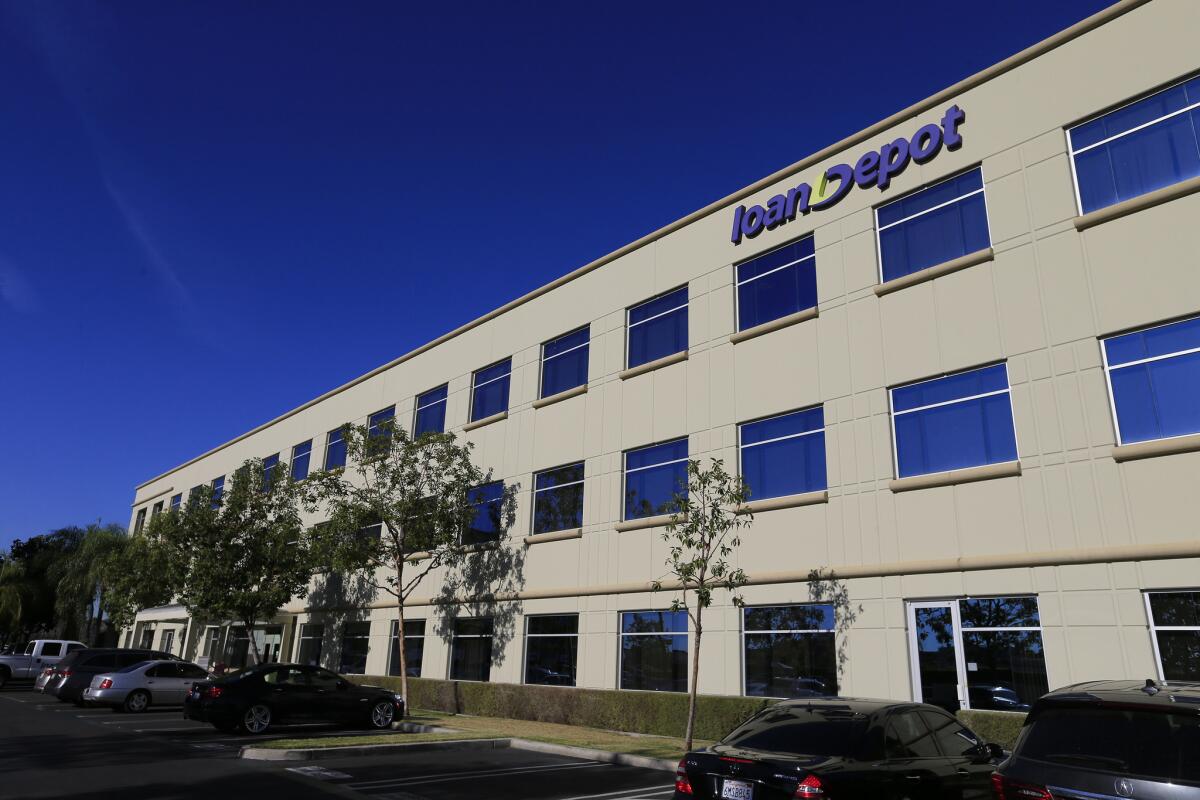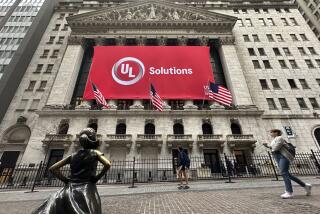Door might be closed on firms’ IPOs

A day before shares were set to begin trading, Foothill Ranch mortgage lender LoanDepot, citing market conditions, said it would withdraw its IPO.
- Share via
This week was one of the year’s worst for the stock market as weak consumer spending and poor retail earnings spooked investors — and possibly closed the door on this year’s batch of initial public offerings.
The Dow Jones industrial average fell more than 1% on Friday, leading to a 665-point loss for the week. That was exceeded only by a loss of more than 1,000 points during one week in August in the midst of the market’s wild reactions to the slowing Chinese economy.
This week’s move into negative territory broke a six-week string of consecutive market gains and couldn’t have been worse news for companies seeking to go public before the end of the year.
Investors were already uneasy about an expected rate hike by Federal Reserve in December. And early in the week Fidelity Investment, the large mutual fund company, discounted by 25% its stake in Snapchat, the hot mobile messaging app that had commanded a valuation of $16 billion. Asset manager BlackRock has previously discounted file storage provider Dropbox, which had been valued at $10 billion.
Then came news of lackluster retail sales in October and weak earnings from Nordstrom and Macy’s, which included reports that foot traffic and sales were down in their stores. That sent the market into a tumble that pushed one local firm to shelve its planned IPO and could persuade others to do the same.
“There’s market volatility, a rate hike is around the corner — why go out in this environment?” said Sam Hamadeh, chief executive of PrivCo, a New York firm that tracks privately held companies. “The tea leaves tell me the IPO window is closed.”
A handful of firms have already delayed planned offerings over the last few months: grocery giant Albertsons, which was set to go public in October, and luxury retailer Neiman Marcus, which filed paperwork for an offering in August but has yet to proceed.
And then late Thursday, a day before shares were set to begin trading, Foothill Ranch mortgage lender LoanDepot, citing market conditions, said it would withdraw its IPO — shelving one of the biggest local offerings this year.
More public offerings are on tap next week, including the much anticipated IPO of payments firm Square and dating site operator Match Group, the owner of hookup app Tinder. Square hopes to raise about $324 million at a valuation of $3.9 billion, while Match hopes to raise $433 million at a valuation of $3.1 billion.
If those firms proceed with their planned offerings, they’ll not only be doing so amid market uncertainty, but they’ll be joining a cohort of newly public companies that have unperformed.
So far this year, 163 firms have gone public, and their stocks trade at an average of about 5% below their IPO price, according to Renaissance Capital, a firm that researches IPOs and manages funds that invest in newly public companies.
That weak showing, along with a volatile stock market, has meant less demand from the wealthy and institutional investors who get the first shot at buying shares in an IPO.
Todd Morgan, chairman of Century City’s Bel Air Investment Advisors, said he used to get calls from wealthy clients who wanted to make sure they were among to first to buy in. But his phone hasn’t been ringing lately.
“I’m not getting any of those calls now — none,” he said. “People are not into speculating right now.”
Still, some companies are likely to continue with plans to go public before year’s end.
Kathleen Smith, principal of Renaissance, noted that while LoanDepot pulled its offering Thursday, another firm, education software provider Instructure, went ahead with its IPO and started trading Friday. Instructure priced its offering at $16 a share, the low end of its expected price range.
“The market hasn’t shut down,” Smith said. “To get a deal done, it has to be bought by buyers. Buyers are in the driver’s seat, and they’re wanting big discounts.”
Richard Peterson, a senior director at market data provider S&P Capital IQ, agreed, saying he doesn’t expect the IPO market to dry up completely, though firms will probably have to settle for raising less cash.
“I suspect issuers and underwriters will seek to get some offerings completed by year end,” he said. “Though that may involve some price cuts or other concessions.”
That may have been why LoanDepot pulled back. The company had hoped to raise more than $500 million, at a valuation of about $2.5 billion — a high valuation compared with other mortgage lenders and one that wary investors might have thought too rich.
But LoanDepot could afford to wait until market conditions improve. The company is profitable, isn’t in urgent need of cash and planned to use much of its IPO proceeds to cash out early investors.
Square, the San Francisco payments company set to sell shares next week, is in an altogether different situation.
The company is not profitable, and its losses have been growing. It lost $132 million through the first nine months of the year, putting it on pace to surpass last year’s loss of $154 million.
Given those mounting losses, Hamadeh said Square might not have the option to postpone its offering. It needs the cash.
That could by why the firm has priced its IPO at a valuation of about $3.9 billion — a big discount to the $6-billion valuation it commanded during its last funding round.
“They’re bleeding money,” he said. “If the IPO doesn’t happen, they have to survive until February.”
Twitter: @jrkoren
More to Read
Inside the business of entertainment
The Wide Shot brings you news, analysis and insights on everything from streaming wars to production — and what it all means for the future.
You may occasionally receive promotional content from the Los Angeles Times.











